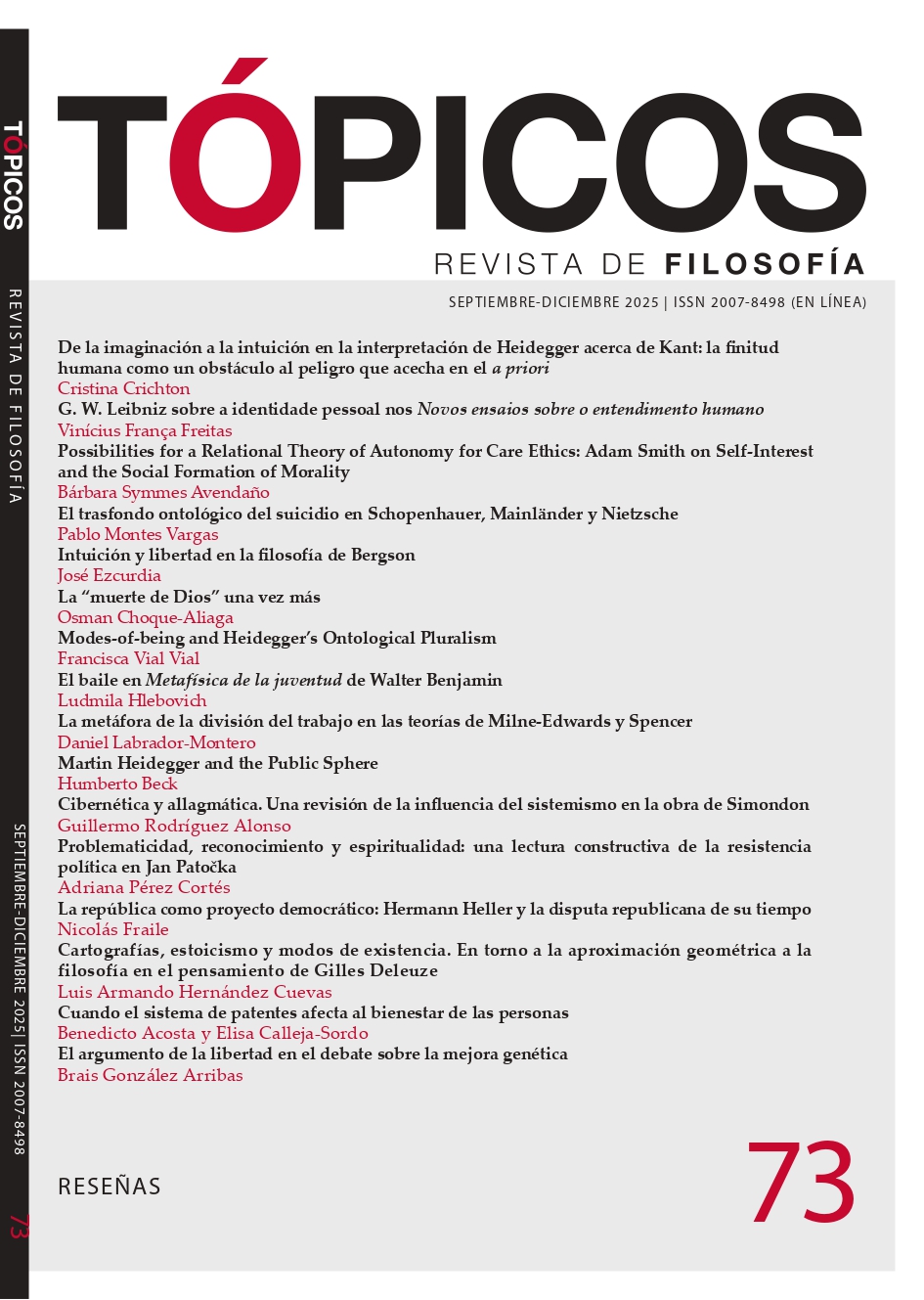G. W. Leibniz sobre a identidade pessoal nos Novos ensaios sobre o entendimento humano
Publiée 2025-08-01
Mots-clés
- autoconsciência,
- consciência,
- fenómenos mentais,
- G. W. Leibniz,
- identidade aparente
- identidade moral,
- identidade pessoal,
- identidade real,
- memória,
- testemunho ...Plus
(c) Copyright Tópicos, Revista de Filosofía 2025

Ce travail est disponible sous licence Creative Commons Attribution - Pas d'Utilisation Commerciale - Pas de Modification 4.0 International.
Comment citer
Résumé
O artigo discute alguns aspectos da compreensão de G. W. Leibniz sobre a identidade pessoal nos Novos ensaios sobre o entendimento humano. Após uma breve introdução às noções de ‘identidade real’ e ‘identidade aparente’ (seção 1), avanço a hipótese sobre a possibilidade de se distinguir entre dois tipos de consciência – a consciência de si (autoconsciência) e a consciência de fenômenos mentais particulares (seção 2). A seguir, discuto a originalidade, no contexto da filosofia moderna, da distinção pensada por Leibniz entre o ‘eu’ e a ‘identidade pessoal’, assim como sistematizo quais são as quatro aparências responsáveis pela última – autoconsciência, consciência, memória e testemunho (seção 3). Por fim, avanço uma hipótese sobre como a identidade moral depende da identidade pessoal (seção 4).
Références
- Bobro, M. (1999). Is Leibniz’s Theory of Personal Identity Coherent? The Leibniz Review, 9, 117-129. https://doi.org/10.5840/leibniz199998
- Bobro, M. (2004). Self and Substance in Leibniz. Springer.
- Boeker, H. (2015). Locke and Hume on Personal Identity: Moral and Religious Differences. Hume Studies, 41(2), 105-135. https://doi.org/10.1353/hms.2015.0006
- Casales, R. (2018). Esbozo de una fundamentación ontológica de la moral en Leibniz. Em R. Casales García e P. Osberto Reyes Cárdenas (eds.), Leibniz en México. Homenaje a Alejandro Herrera (pp. 207-220). Editorial Torres Asociados.
- Casales, R. (2019). Apercepción y conscientia em la ontología monadológica de Leibniz. Veritas, 43, 49-67. http://dx.doi.org/10.4067/S0718-92732019000200049
- Descartes, R. (2004). Meditações sobre filosofia primeira. F. Castilho (trad.). UNICAMP.
- Forstrom, J. (2011). John Locke and Personal Identity: Immortality and Bodily Ressurrection in Seventeenth-Century Philosophy. Continuum.
- Freitas, V. (2019a). A objeção de Thomas Reid à teoria humiana da identidade pessoal. Cadernos de Filosofia Alemã. 24, 53-59.
- Freitas, V. (2019b). David Hume sobre a identidade pessoal nos Livros I e II do Tratado. Filosofia Unisinos. 20, 46-54. https://doi.org/10.4013/fsu.2019.201.06
- Freitas, V. (2022). David Hume sobre a dimensão corporal do eu. Principia. 26, 489-508. https://doi.org/10.5007/1808-1711.2022.e84751
- Garber, D. (2009). Leibniz: Body, Substance, Monad. Oxford University Press. https://doi.org/10.1093/acprof:oso/9780199566648.001.0001
- Gennaro, R. (1999). Leibniz on Consciousness and Self-Consciousness. Em R. J. Gennaro e C. Huenemann (eds.), New Essays on Rationalists (pp. 353-371). Oxford University Press. https://doi.org/10.1093/0195165411.003.0017
- Hume, D. (2001). Tratado da natureza humana. D. Danowski (trad.). UNESP.
- Jolley, N. (1984). Leibniz and Locke. A Study of the New Essays on Human Understanding. Oxford University Press.
- Jolley, N. (2020). Leibniz. Routledge University Press.
- Kulstad, M. (1982). Leibniz on Consciousness and Reflection. Southern Journal of Philosophy, 21(sup. 1), 39-66. https://doi.org/10.1111/j.2041-6962.1983.tb01536.x
- Kulstad, M. (1991). Leibniz on Apperception, Consciousness and Reflection. Philosophia Verlag.
- Leibniz, G. W. (1885). Monadologie. Em C. I. Gerhardt (ed.), Die Philosophifchen Schriften von Gottfried Wilhelm Leibniz. VI (pp. 607-623). Olms Verlagsbuchhandlung.
- Leibniz, G. W. (1885). Principes de la nature et de la grace, fondés en raison. Em C. I. Gerhardt (ed.), Die Philosophifchen Schriften von Gottfried Wilhelm Leibniz. VI (pp. 598-607). Olms Verlagsbuchhandlung.
- Leibniz, G. W. (1978). Die Philosophifchen Schriften von Gottfried Wilhelm Leibniz. V. Nouveaux essais sur l’entendement humain. C. I. Gerhardt (ed.). Georg Olms.
- Leibniz, G. W. (1999). Sämtliche Schriften und Briefe. Reihe VI. Band IV. Berlin−Brandenburgischen Akademie der Wissenschaften-Niedarsächsischen Akademie Der Wissenschaften in Göttingen.
- Leibniz, G. W. (2004). Discurso de metafísica e outros textos. M. Chauí e A. da Cruz Bonilha (trads.). Martins Fontes.
- Locke, J. (1999). Ensaio sobre o entendimento humano. E. Abranches Soveral (trad.). Fundação Calouste Gulbenkian.
- Loque, F. (2022). John Locke e a identidade pessoal: um impasse relativo à justiça. Filosofia Unisinos, 23(3), 1-13. https://doi.org/10.4013/fsu.2022.233.06
- Mates, B. (1986). The Philosophy of Leibniz: Metaphysics & Language. Oxford University Press.
- McCullough, L. (1994). Leibniz’s Principle of Individuation in His Disputatio metaphysica de principio individui of 1663. Em K. F. Barber e J. J. E. Gracia (eds.), Individuation and Identity in Early Modern Philosophy (pp. 201-218). State University of New York Press.
- McCullough , L. (1996). Leibniz on Individuals and Individuation: The Persistence of Premodern Ideas in Modern Philosophy. Springer.
- McIntyre, J. (2009). Hume and the Problem of Personal Identity. Em D. Norton (ed.), The Cambridge Companion to Hume: Second Edition (pp. 177-208). Cambridge University Press. https://doi.org/10.1017/CCOL9780521859868.006
- McRae, R. (1976). Leibniz: Perception, Apperception, and Thought. University of Toronto Press. https://doi.org/10.3138/9781487579777
- Mijuskovic, B. (1975). Locke and Leibniz on Personal Identity. Southern Journal of Philosophy, 13(2), 205-214. https://doi.org/10.1111/j.2041-6962.1975.tb01223.x
- Mugnai, M. (2001). Leibniz on Individuation: From the Early Years to the ‘Discourse’ and Beyond. Studia Leibnitiana, 33(1), 36-54.
- Pelletier, A. (2021). ‘Ego Sum Monas’: les hypotyposes de la substance chez Leibniz. Revue Internationale de Philosophie, 296, 67-85. https://doi.org/10.3917/rip.296.0067
- Reid, T. (2002). Essays on the Intellectual Powers of Man. D. Brookes (ed.). Edinburgh University Press.
- Strawson, G. (2011). Locke on Personal Identity: Consciousness and Concernment. Princeton University Press.
- Scheffler, S. (1976). Leibniz on Personal Identity and Moral Personality. Studia Leibnitiana, 8(2), 219-240.
- Simmons, A. (2001). Changing the Cartesian Mind: Leibniz on Sensation, Representation and Consciousness. The Philosophical Review, 110(1), 31-75. https://doi.org/10.2307/2693597
- Vailati, E. (1985). Leibniz’s Theory of Personal Identity in the New Essays. Studia Leibnitiana, 17(1), 36-43.
- Wilson, C. (1990). Leibniz Metaphysics. Princeton University Press. https://doi.org/10.1515/9781400879571
- Wilson, M. (1999). Ideas and Mechanism: Essays on Early Modern Philosophy. Princeton University Press. https://doi.org/10.1515/9781400864980





